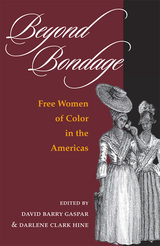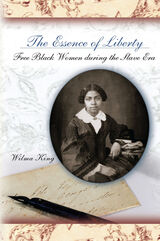2 books about King, Wilma

Beyond Bondage
Free Women of Color in the Americas
Edited by David Barry Gaspar and Darlene Clark Hine
University of Illinois Press, 2004
Emancipation, manumission, and complex legalities surrounding slavery led to a number of women of color achieving a measure of freedom and prosperity from the 1600s through the 1800s. These black women held property in places like Suriname and New Orleans, headed households in Brazil, enjoyed religious freedom in Peru, and created new selves and new lives across the Caribbean. Beyond Bondage outlines the restricted spheres within which free women of color, by virtue of gender and racial restrictions, carved out many kinds of existences. Although their freedom--represented by respectability, opportunity, and the acquisition of property--always remained precarious, the essayists support the surprising conclusion that women of color often sought and obtained these advantages more successfully than their male counterparts.
[more]

The Essence of Liberty
Free Black Women During the Slave Era
Wilma King
University of Missouri Press, 2006
Before 1865, slavery and freedom coexisted tenuously in America in an environment that made it possible not only for enslaved women to become free but also for emancipated women to suddenly lose their independence. Wilma King now examines a wide-ranging body of literature to show that, even in the face of economic deprivation and draconian legislation, many free black women were able to maintain some form of autonomy and lead meaningful lives.
The Essence of Liberty blends social, political, and economic history to analyze black women’s experience in both the North and the South, from the colonial period through emancipation. Focusing on class and familial relationships, King examines the myriad sources of freedom for black women to show the many factors that, along with time spent in slavery before emancipation, shaped the meaning of freedom. Her book also raises questions about whether free women were bound to or liberated from gender conventions of their day.
Drawing on a wealth of untapped primary sources—not only legal documents and newspapers but also the diaries, letters, and autobiographical writings of free women—King opens a new window on the world of black women. She examines how they became free, educated themselves, found jobs, maintained self-esteem, and developed social consciousness—even participating in the abolitionist movement. She considers the stance of southern free women toward their enslaved contemporaries and the interactions between previously free and newly freed women after slavery ended. She also looks closely at women’s spirituality, disclosing the dilemma some women faced when they took a stand against men—even black men—in order to follow their spiritual callings.
Throughout this engaging history, King underscores the pernicious constraints that racism placed on the lives of free blacks in spite of the fact that they were not enslaved. The Essence of Liberty shows the importance of studying these women on their own terms, revealing that the essence of freedom is more complex than the mere absence of shackles.
[more]
READERS
Browse our collection.
PUBLISHERS
See BiblioVault's publisher services.
STUDENT SERVICES
Files for college accessibility offices.
UChicago Accessibility Resources
home | accessibility | search | about | contact us
BiblioVault ® 2001 - 2024
The University of Chicago Press









